QROMA is a student organization at LSU dedicated to those who desire to be part of a diverse, open-minded community.
A combination of the prefix “chroma,” meaning color, with the first two letters replaced by a “q” to represent the queer umbrella. QROMA is a young organization on campus filling a necessary role, reaching out to minorities of color, sexual orientation, and gender to cultivate a safe space for students who feel a lack of representation.
QROMA addresses intersectionality, an elegant ideology that brings various civil rights battles to the front lines of political discussion. Megan Gilliam, QROMA president, exudes intersectionality in her everyday life.
“I see myself as a gay black woman, and therefore I can’t ignore any part of me because those identities all form one specific person,” Gilliam said.
A member of QROMA, Chris (who requested his last name remain private), compared intersectionality to the art of cooking.
“A dish takes many spices and ingredients to become that one dish, so if you change one spice it’s a completely different dish.” Imani Maxberry, QROMA Vice-President, agreed with Chris’ analogy.
“For QROMA, it’s bringing all those dishes together and having one big gumbo,” Maxberry said. And gumbo is nothing without a little heat.
Some may wonder, “Why uplift the word ‘queer’?”
This word, like most derogatory slang, had humble beginnings as a synonym of “strange” or “different.” However, it has been used as an insult against homosexuals in particular for centuries, which drives Gilliam, Maxberry, and Chris to say it even louder.
To some members of the LGBTQ community, “queer” can be used as a word of empowerment, a tool in taking back the dignity that those in the past had lost to the word’s insulting sting.
They compare the use of “queer” by queer people to the resurgence of the “n” word as a colloquial term within the black community, considering both share a sordid history as terms of oppression. Maxberry described it as “taking the negative and making it our own.” Gilliam added, “…by us saying [queer], I think it’s more palatable,” and dubs it “reassimilation.” They danced around the word “empowering,” which sat in the back of their throats with each response they gave.
Of course, using a word with such a strong connotation inevitably creates polarization. While there are those who revel in the power the word brings, there are those who steer clear of its mentioning.
“[Some people] might not necessarily want that label on them,” Chris stated. But it goes both ways.
“For some people it can be kind of empowering to know that there are other people who are in this.”
Either way, this LGTBQ organization is not hurting from the definitive choice of their language.
With only one year under its belt, QROMA boasts upwards of 50 members. They are grateful for a continued increase in membership, but the leaders of QROMA find mass awareness to be their most urgent goal.
“We’re trying to be that organization where people aren’t so scared to be informed,” Maxberry noted. “We’re full on for people who aren’t even in that community to come to our meetings because they tend to be more accepting the more information they know.”
Though they’re having some difficulty getting their name out there, the leaders of QROMA said that there has never been a challenge they couldn’t face. “[The question] isn’t even ‘can we,’ but ‘when we,’” Gilliam stated.
Those who aren’t a part of this community may feel at a loss of how to incorporate QROMA’s message into their lives, but Gilliam mused on a friend’s words— “Never think that because you’re in the majority, that’s the normal… it’s the common.”
In order to reverse harmful thinking, Gilliam insisted on listening, always and carefully. She called it “responding rather than reacting.”
Throughout the perpetual battle for representation, QROMA serves as a haven for any and all. Gilliam smiled and said, “I really love when we come together, I feel at home.”
Maxberry agreed. “Such a good feel. We don’t ever want that to change no matter how many people we get.”
Their last piece of advice was simple: “Come to QROMA meetings. We’ll come to yours.”
QROMA: Representation on the Rise
By Emily Price
November 19, 2015





